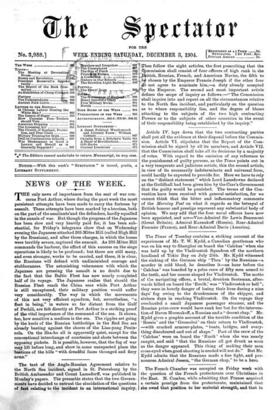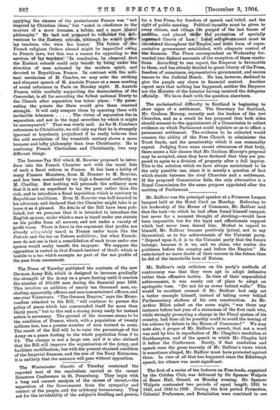applying the clauses of the protectorate France was "not inspired
by Christian ideas," but "acted in obedience to the maxims of a more humane, a loftier, and a more liberal philosophy." He had not proposed to withdraw the ea- ventions to the Eastern schools, although he would ,prefer lay teachers, who were too scarce. The future of the French religious Orders abroad might be imperilled owing to French laws, but this was a reason for appealing to the services of lay teachers :' conclusion, he obaerved that the Eastern schools could only benefit by being 'under the direction of men actuated by the modern spirit, and devoted to Republican France. In contrast with the mili- tant secularism of M. Combe,s, we may note the striking and eloquent speech of M. Anatole France at a mass meeting of social reformers in Paris on Monday night. M. Anatole France, while cordially supporting the denunciation of the Concordat, is all for according the fullest national liberty to the Church after separation has taken place. "By perse- cuting the priests the State would give them renewed strength. It will only conquer them by opposing them with
invincible tolerance The virtue of separation lies in separation, and not in the legal severities by which it might be accompanied." That was wisely said. As for M. Combes's references to Christianity, we will only say that he is strangely ignorant or hopelessly prejudiced if he really believes that the arid secularism of the twentieth century shows a more humane and lofty philosophy than true Christianity. He is confusing French Clericalism and Christianity, two very different things.







































































 Previous page
Previous page